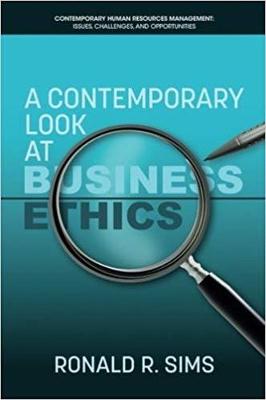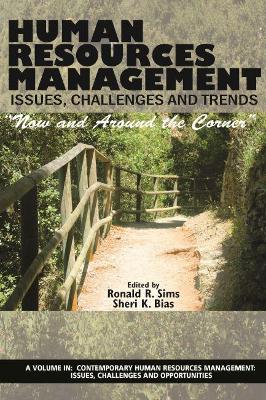Contemporary Human Resources Management Issues, Challenges and Opportunities
6 total works
A Contemporary Look at Business Ethics provides a `present day’ look at business ethics to include the challenges, opportunities and increased need for ethical leadership in today’s and tomorrow’s organizations. The book discusses current and future business ethics challenges, issues and opportunities which provides the context leaders and their organizations must navigate.
The book includes an in?depth look at lessons learned about the causes of unethical behavior by examining a number of real?world examples of ethical scandals from around the world that have taken place over the past few decades. The analysis of the various ethical scandals focuses on concepts like ethical versus unethical leadership, received wisdom, the bottom?line mentality, groupthink and moral muteness, all of which contribute to the kind of organizational culture and ethical behavior one finds in an organization. The book discusses ethical decision making in general and the increased role of religion and spirituality, in confronting unethical behavior in contemporary organizations.
The book also takes an in?depth look at the impact ethical scandals have on employees and more specifically the psychological contract and person?organization ethical fit with the goal of identifying, along with other things, what leaders can do to restore relationships with employees and rebuild the organization’s reputation in the eyes of various stakeholders.
The book includes an in?depth look at lessons learned about the causes of unethical behavior by examining a number of real?world examples of ethical scandals from around the world that have taken place over the past few decades. The analysis of the various ethical scandals focuses on concepts like ethical versus unethical leadership, received wisdom, the bottom?line mentality, groupthink and moral muteness, all of which contribute to the kind of organizational culture and ethical behavior one finds in an organization. The book discusses ethical decision making in general and the increased role of religion and spirituality, in confronting unethical behavior in contemporary organizations.
The book also takes an in?depth look at the impact ethical scandals have on employees and more specifically the psychological contract and person?organization ethical fit with the goal of identifying, along with other things, what leaders can do to restore relationships with employees and rebuild the organization’s reputation in the eyes of various stakeholders.
When a New Leader takes Over: Toward Ethical Turnarounds takes a detailed look at the experiences of new leaders who are charged with turning an organization around following an ethical scandal. The challenges confronting new leaders who are tasked with restoring trust, rebuilding reputation, and turning around an organization following an ethical scandal are discussed along with specific actions taken by these leaders during the turnaround process. A main focus of the book is to offer insight into the difficult situations confronting new leaders at the beginning, during and after their turnaround experiences which means turning an unethical organizational culture into an ethical one. A number of examples of turnaround efforts that have taken place over the past two decades are included to provide the most comprehensive documentation of the ethical turnaround process.
The book includes an in-depth look at what led to the unethical behavior by examining a number of real-world examples of ethical scandals from around the world. The book will provide an analysis of the various ethical scandals by focusing on concepts like unethical leadership, received wisdom, groupthink and moral silence, all of which contribute to the kind of organizational culture and unethical behavior one finds in organizations that experience ethical scandals. The book also discusses proactive leadership and its importance in implementing ethical turnarounds based on values-based leadership, employee involvement and ethics education. A main premise of this book is that new leaders can successfully create an organization environment to rebuild and institutionalize ethical behavior as part of the turnaround process and sustain ethical behavior beyond the turnaround.
The book will be of interest to employees at all levels of an organization, business professionals and other practitioners and others who have an interest in organization change, transformation and ethical turnarounds.
The book includes an in-depth look at what led to the unethical behavior by examining a number of real-world examples of ethical scandals from around the world. The book will provide an analysis of the various ethical scandals by focusing on concepts like unethical leadership, received wisdom, groupthink and moral silence, all of which contribute to the kind of organizational culture and unethical behavior one finds in organizations that experience ethical scandals. The book also discusses proactive leadership and its importance in implementing ethical turnarounds based on values-based leadership, employee involvement and ethics education. A main premise of this book is that new leaders can successfully create an organization environment to rebuild and institutionalize ethical behavior as part of the turnaround process and sustain ethical behavior beyond the turnaround.
The book will be of interest to employees at all levels of an organization, business professionals and other practitioners and others who have an interest in organization change, transformation and ethical turnarounds.
Human Resources Management Issues, Challenges and Trends
by Ronald R. Sims
Published 30 January 2019
Human Resources Management Issues, Challenges and Trends: “Now and Around the Corner” explores and provides an updated look at some of the challenges, trends and issues HRM professionals will need to focus on now and around the corner. Like other departments in the broader organization HRM professionals will need to increasingly demonstrate how they add value and contribute to the organization’s success. While the trends, challenges and issues impacting organizations and HRM professionals will continue to change over the years, the bottom-line of organization success is the clear reality that employees are their best assets and the need for effective HRM.
The book is intended to help to better understand the ongoing transformation of HRM given the issues, challenges and opportunities offered by the contributors to this book. This means the book discusses the ever evolving role of HRM professionals to include discussion of how the profession must continue to become more adaptive, resilient, quick to change direction and customer-centered in its efforts to help meet the human resource needs of contemporary organizations and their employees. The book contributes to the ongoing dialogue and insights offered by HRM experts on what HRM professionals and their organizations can do in the face of such challenges, trends and issues in their efforts to win the talent wars.
The book is intended to help to better understand the ongoing transformation of HRM given the issues, challenges and opportunities offered by the contributors to this book. This means the book discusses the ever evolving role of HRM professionals to include discussion of how the profession must continue to become more adaptive, resilient, quick to change direction and customer-centered in its efforts to help meet the human resource needs of contemporary organizations and their employees. The book contributes to the ongoing dialogue and insights offered by HRM experts on what HRM professionals and their organizations can do in the face of such challenges, trends and issues in their efforts to win the talent wars.
Succeeding as a Frontline Manager in Today’s Organizations
by Ronald R. Sims
Published 30 January 2021
Succeeding as a Frontline Manager in Today’s Organizations highlights the fact that as the world of work continues to change in response to a variety of trends, issues and opportunities, manages on the frontline will still be expected to see that their organizations operate both effectively and efficiently to not only survive but to thrive. To do this, frontline managers (FLMs) must continue to learn and develop their skills to get the organization’s work done through its people. This book examines both the traditional and contemporary skills todays frontline managers must have at a minimum and those they must successfully learn to implement to fulfill their critical roles and responsibilities. The book argues that FLMs will continue to play a critical role in helping their organizations pursue and achieve their strategic, tactical and operational goas efficiently and effectively. By focusing on the skills a good FLM needs, this book offers specificity on what the FLM and their organizations must do to increase the potential for the success of FLMs in having a positive influence on the organization overall by focusing both on results and the well-being of employees. The book examines not only looks at the essentials of effective management but discusses the importance of how one becomes and makes a smooth transition to the role of a FLM. In addition, the book examines the essential elements of management—planning, organizing, controlling, and leading—while also offering an in-depth look at the important role FLMs can and should play as it relates to ethics, building and leading effective teams, and safety and health. Each chapter offers insights into what FLMs can do to be effective in their work, particularly for those FLMs who want to continue to develop themselves as they play the different roles and exercise different skills in doing their jobs. In the end, this book is written for, those who are interested in increasing their understanding of the FLMs role, responsibilities and skills needed to be effective while also getting those who work for them to accomplish their work effectively, efficiently and productively on their own or as a member of a group or team.
Human Resources Management and Ethics: Responsibilities, Actions, Issues, and Experiences, explores and provides an in-depth look at the responsibilities, actions, issues and experiences related to HRM and ethics for individual employees, organizations and the broader society. Like other departments in the broader organization HRM professionals will need to increasingly demonstrate how they contribute to an organization’s ethical orientation and overall performance or success. While the ethical challenges, trends, and issues impacting employees, organizations and HRM professionals will continue to change over the years (consider the recent ethical challenges related cybersecurity and data breaches) the bottom-line of organization success is the clear reality that doing the right thing or institutionalizing an ethical culture or character is just as important to various stakeholders. The chapters in this book provide an updated, current and future look at the relationship between HRM and ethics and across various sectors or organizations (i.e. public, private, not-for-profit, academic, etc.). That is, this book discusses the ever evolving role of HRM professionals to include discussion of how the profession continues to take on more responsibility for developing and institutionalizing an ethical culture in their organizations, industries and the broader society. The book also contributes to the need for ongoing dialogue, discussion or insights offered by HRM experts on what HRM professionals and their organizations can do in the face of ethical expectations, challenges and scandals. In the end, the book is intended to increase our understanding of the ethical responsibilities, actions, issues and experiences that arise both within HRM and in HRM’s interactions with individuals and organizations.
Why with hundreds and hundreds of books on leadership to choose from, why another one?” The answer is simple. Given the importance of leadership and leaders in organizations there will always be efforts to try to improve our understanding on how we can improve the leadership process. Leadership, Leaders and Leading focuses on the age old reality that successful organizations will continue to need effective leaders at all levels. The book is based on the premise that effective leaders need to be able to establish a shared vision and accompanying strategy that other members of the organization strongly believe in and are willing to help execute. The book argues that we can continue to learn from traditional and contemporary theories and myths about effective leadership & leaders and how they can successfully lead an increasingly diverse and demanding workforce, consumers and the broader society. The book discusses foundational leadership skills like motivation, communication, building leader-follower relationships, groups and teams, developing others, conflict, negotiation and organizational politics along with highlighting the important role leaders should play in the areas of human resource management, ethics, crisis and reputation management, sustainability/sustainable development, and cybersecurity. Each chapter offers the opportunity for the reader to increase their understanding of leadership, leaders and leading in an increasingly dynamic world of work. This book is written for those who are interested in the continued effort and dialogue on what effective leadership, leaders and leading should entail in the coming years.



